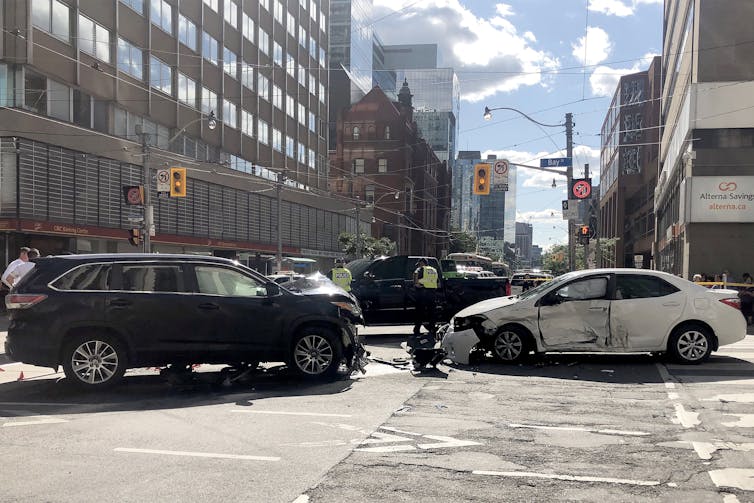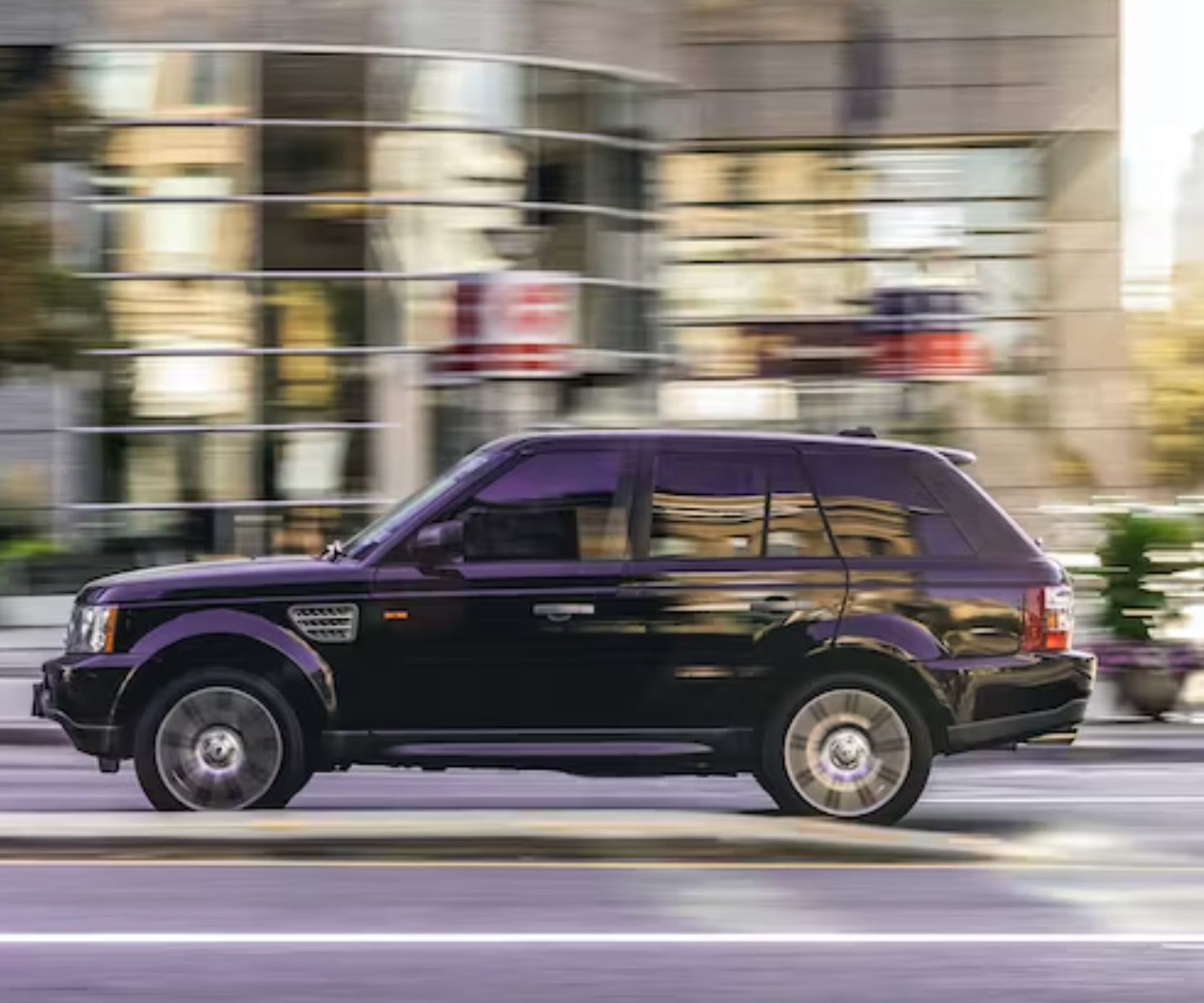
SUVs produce more greenhouse gas emissions per kilometer than cars on average. (Brandon Green/Unsplash)
Zoe Long, Simon Fraser University and Jonn Axsen, Simon Fraser University
When it comes to vehicular popularity, SUVs are winning in Canada. Eighty per cent of new vehicles sold in Canada in 2020 and 2021 were SUVs and pickup trucks. These sales levels were only 55 per cent a decade ago. Unfortunately, the trend comes at the expense of the climate.
In Canada, SUVs produce around one-third more greenhouse gas emissions per kilometre than cars on average. Over the past decade, our fuel economy standards have been improving the efficiency of new vehicles, but the switch towards SUVs, pickups and minivans has been counteracting those efforts. From 1990 to 2019, emissions from SUVs and other trucks more than doubled in Canada, leading to a 40 per cent increase in total passenger vehicle emissions during that period.
This has threatened Canada’s commitments to cut greenhouse gas (GHG) emissions by 40-50 per cent by 2030, and to reach net zero emissions by 2050. To explore the tension between the demand for SUVs and its climate challenges, we used a mixed-method approach to study consumer behaviour through consumers’ in-depth stories and the overall trends.
We surveyed nearly 1,000 representative SUV drivers, car drivers and non-drivers in Metro Vancouver and followed up with some of them in focus group discussions for our study. We found that while SUV users are drawn to the vehicle because of features that provide comfort, style and safety, some were willing to downsize due to policy changes.
Comfort and lifestyle
We found that SUV drivers believe their vehicles are superior to other cars in several ways. In the survey, SUV drivers are statistically more likely to see their vehicle as “reliable,” “sensible” and “family-oriented” compared to car drivers.
These drivers provided a long list of the functional benefits of their SUV, including improved comfort, increased storage space and plenty of room for family, passengers and pets.
With SUVs, safety comes first
SUV drivers believe their vehicles are safer for everyone, including themselves and their passengers, pedestrians, cyclists and even for the transportation system.
As one SUV driver said in a focus group, “I felt safer in a SUV if I were to get into an accident … I just feel more protected in a SUV versus a car.”

Police say five pedestrians were struck in downtown Toronto after an SUV allegedly ran a red light at a busy intersection on Aug. 22, 2019. SUVs provide passive safety for their drivers, but are unsafe to pedestrians, cyclists and other vehicles. THE CANADIAN PRESS/Emerald Bensadoun
In contrast, car drivers and non-drivers are more likely to find SUVs unsafe for passengers, pedestrians, cyclists and the transportation system, which is actually the case.
SUVs are nearly one-third more likely to kill pedestrians when compared to cars. One study from the United States found that over 1,000 pedestrian deaths could have been avoided over 20 years if SUV buyers had stuck with cars. Canadian journalist Malcolm Gladwell describes this phenomenon as SUV drivers’ preference for the passive safety — which is offered by a bigger vehicle when getting hit by something — over the active safety benefits of cars, which is their ability to avoid collisions due to improved handling and breaking.
SUVs help users fit in
Our research also found a strong social influence element to the SUV trend. SUVs are increasingly seen as “common,” “normal” and the “right vehicle to have.”
In a focus group, one SUV driver told us, “my neighbours they love SUVs … they’re everywhere here.” Our survey found that SUV drivers were significantly more likely to say statements such as “my friends and family would approve that I bought an SUV” and “many of my friends and family own SUVs”.
Willingness to downsize
In the interest of shifting these trends, we explored the potential of different actions to sway people away from SUVs. In our survey, only 28 per cent of those planning to buy an SUV would consider downsizing to a car without any policy or other change.
Policy and regulation changes can help encourage downsizing SUVs.
Some policies like financial penalties or incentives would encourage more SUV users to downsize. A drop of 20 per cent in insurance costs for cars would prompt 36 per cent of SUV intenders to downsize. Ten per cent higher purchase price taxes on SUVs would prompt 35 per cent to downsize, while a $5 toll to enter the City of Vancouver for SUVs only would prompt 33 per cent to downsize.
Policy changes can reduce SUV emissions
Today, Canada’s vehicle fuel efficiency standards are lenient towards SUVs and pickup trucks, which may have perversely incentivized the current trend towards SUVs. Carefully re-designing existing regulations to avoid such loopholes can be one option to address the climate change concerns posed by SUVs.
Another option is using financial tools that swayed decisions in our survey results, namely tools that make cars cheaper to buy and operate than SUVs.
The current schedule for increasing carbon pricing in Canada could potentially shift buyers towards smaller vehicles over time by increasing the cost of gasoline. Unfortunately, car buyers are notoriously short-sighted at the time of purchase and tend to undervalue long-term fuel cost savings.
Other pricing mechanisms could include extra purchase taxes for gas guzzling vehicles or tax breaks and other fee reductions for buyers of smaller cars. Reduced vehicle insurance rates for smaller vehicles could be a win-win policy, providing road safety benefits and reducing GHG emissions, from the resultant downsizing.
Without pursuing a policy path, challenging the cultural and market entrenchment of SUVs will be tricky. Canadians are unlikely to end their SUV obsession on their own. We need policy actions to reduce the use of GHG-intensive vehicles and pursue our climate goals.

Zoe Long, PhD Student in Sustainable Transportation, Simon Fraser University and Jonn Axsen, Professor of Sustainable Transportation, Simon Fraser University
This article is republished from The Conversation under a Creative Commons license. Read the original article.
« Voix de la SRC » est une série d’interventions écrites assurées par des membres de la Société royale du Canada. Les articles, rédigés par la nouvelle génération du leadership académique du Canada, apportent un regard opportun sur des sujets d’importance pour les Canadiens. Les opinions présentées sont celles des auteurs et ne reflètent pas nécessairement celles de la Société royale du Canada.


